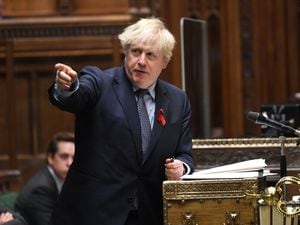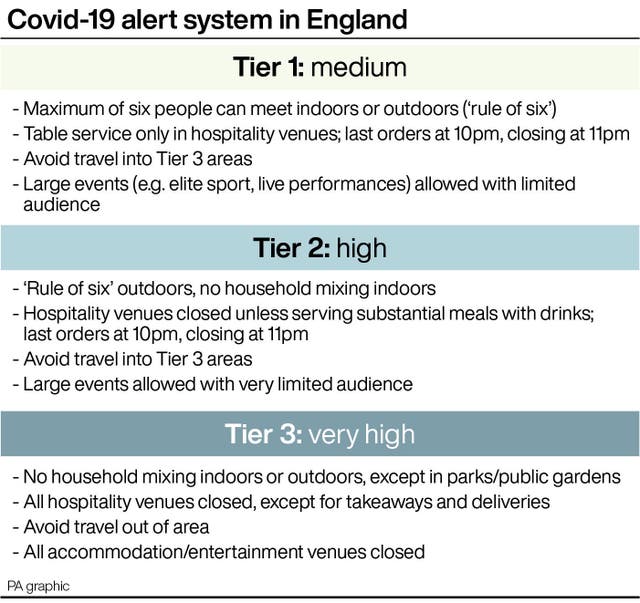Tier 2 confirmed for Shropshire as MPs back coronavirus restrictions
Shropshire MPs voted with the Government as the plans for new regional coronavirus restrictions were approved despite a significant Tory rebellion.

Their backing paves the way for 99 per cent of England to enter the toughest Tier 2 and 3 restrictions when the second national lockdown ends on Wednesday.
The House of Commons voted by 291 votes to 78 – a Government majority of 213 – for the new restrictions on Tuesday evening.
Fifty-five Conservatives rebelled over the measures, with 53 voting against the Government and a further two acting as tellers for the noes in the biggest rebellion of this Parliament.
But the measures passed with Labour ordering its MPs to abstain after leader Sir Keir Starmer warned the plans pose a “significant” health risk.
The measures will see Shropshire, including Telford & Wrekin, placed into Tier 2 of the three-tier system, meaning pubs will be allowed to open, but must serve a "substantial" meal with any drinks sold.
All of Shropshire's MPs - Owen Paterson, Philip Dunne, Daniel Kawczynski, Lucy Allan and Mark Pritchard - voted with the Government in support of the measures, as did fellow Conservative Craig Williams, the MP for Montgomeryshire.
Ms Allan, MP for Telford, said while she was concerned about the hospitality trade and the ban on social mixing, she was reassured that MPs would get a second chance to vote on the restrictions in February.
“Given that gyms, shops, places of worship, sports, and hairdressers will be open everywhere we are clearly on the road, albeit cautiously, to more normal living," she said.

"The restrictions are on social mixing and that does of course have terrible consequences for hospitality and the hospitality supply chain but this will be revisited with a vote in Parliament on February 2."
She said it came as a relief that Telford had been placed in Tier 2, and had not been lumped together with other areas of the West Midlands which had a higher infection rate.
"My constituents see this as the first step in the relaxation of restrictions and are broadly satisfied with where we are on the journey to Tier 1," she added.
Mr Kawczynski, MP for Shrewsbury and Atcham, said he would also be voting for the restrictions after receiving reassurances that the measures would be reviewed in the New Year.

"The Government is spinning a lot of plates at the moment, with the virus and the Brexit negotiations, and it is doing a good job," he said.
Mr Kawczynski said he had been convinced after seeing how united the cabinet was based on strong medical advice.
But he added that the vaccine was the real great hope, and said the country should be proud of how it had taken a leading role in developing a solution.
Ludlow MP Mr Dunne voted in support of the measures, saying that as an ex-health minister he was very concerned about the risk of the NHS being overwhelmed.
Mr Pritchard, MP for The Wrekin, said it was important to ensure a satisfactory exit strategy was in place.
"Lives need to be protected, but so do livelihood," he said. "The balance has to be right."
Rebellion
A Government spokesman welcomed the backing from the Commons to “help to safeguard the gains made during the past month and keep the virus under control”.
But he said that ministers will “continue to work with MPs who have expressed concerns in recent days”.
The Prime Minister announced a one-off payment of £1,000 for pubs forced to remain closed under the restrictions in an attempt to reduce the scale of the revolt, though the move was branded “derisory” by the trade.
Mr Johnson acknowledged concerns of a perceived “injustice” in the allocation of tiers but reassured MPs that the Government would look at a more focused approach in the future.
The House of Lords was expected to approve the plans later on Tuesday.
Most pubs in the country will face hampered trade by the measures.
Those in Tier 2, which will cover 57 per cent of England’s population, will only be able to serve alcohol alongside a “substantial meal” and must obey rules restricting household mixing indoors.
In Tier 3, pubs and restaurants will only be able to offer takeaway and delivery services.
Kate Nicholls, chief executive of trade body UKHospitality, said: “A one-off payment of £1,000 for pubs forced to close does not even count as a token gesture.”
The tiers will be reviewed every fortnight and Mr Johnson promised MPs a fresh vote on whether to keep the system before February 2.
Tory backbenchers were outraged that the Government’s impact assessments on the three-tiered system did not include a detailed breakdown of the economic effects of the measures.
Their anger was further compounded by a report in the Times which revealed the existence of a Whitehall dashboard detailing Covid-19’s impact on almost 40 sectors of the economy.
A red rating, which indicates significant job cuts and revenue losses, was said to be against dozens of them, including aerospace, the automotive industry, retail, hospitality, tourism, arts and sport.
The anger on the Tory benches was set out by prominent backbenchers.
Sir Graham Brady, the influential chairman of the 1922 Committee and a Tory MP in Tier 3 Greater Manchester, said: “If Government is to take away fundamental liberties of the people whom we represent, they must demonstrate beyond question that they’re acting in a way that is both proportionate and absolutely necessary.
“Today, I believe the Government has failed to make that compelling case.”
Former Cabinet minister Damian Green, an MP in Tier 3 Kent, said the plans lacked public support, adding: “I’ve had the most angry emails over a weekend since the Dominic Cummings’ trip to Barnard Castle.”
Labour leader Sir Keir Starmer said the Prime Minister’s strategy posed a “significant” health risk and it was “highly unlikely” to see restrictions eased in parts of the country before Christmas.

He accused Mr Johnson of “overpromising and under-delivering” by pursuing an approach of short-term decisions that then “bump into the harsh reality of the virus”.





